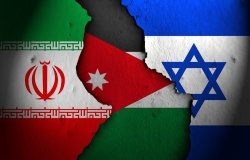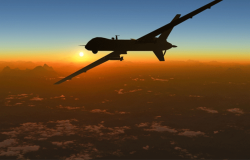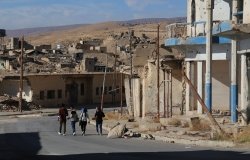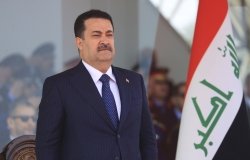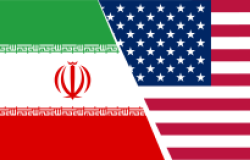Why 'Soft' Power in Iran is Counterproductive
Haleh Esfandiari and Robert Litwak explain why the realities in the diplomatic arena and on the ground in Iran call for a change of approach in U.S. foreign policy.
When President Mahmoud Ahmadinejad of Iran addressed faculty members and students at Columbia University last month, he invited everyone present to visit Iran and to engage the faculty members and students at its 400 universities. He failed to mention that Iran's academics refrain from accepting invitations to attend conferences abroad, for fear of being arrested and accused of belonging to networks recruited to bring about regime change in their country. Indeed, Iran's own minister of intelligence warned students, scholars, and intellectuals this year not to accept such invitations, because, while abroad, they would be recruited for the work of regime change.
While in New York, President Ahmadinejad, at a dinner arranged by the Iranian Mission to the United Nations, met with American scholars who work on U.S.-Iranian relations and with representatives of nongovernmental organizations. Yet the Iranian president failed to explain why he was inviting comments from this group even as his government was curtailing the activities of Iranian NGO's and preventing their members from attending workshops outside Iran. The Ahmadinejad government's broad crackdown on Iran's civil society, described by some observers as a cultural revolution, has essentially criminalized the activities of academics, journalists, and activists for women's rights and human rights.
The United States has begun a $75-million program to promote democracy by supporting Iranian NGO's. That program, coupled with loose talk about regime change from members of Congress, commentators close to the administration, and individuals within the administration, has fed a sense of vulnerability and paranoia among elements of Iran's ruling regime. Those elements believe that the United States, entangled in Iraq and Afghanistan, is no longer capable of a military intervention in Iran. Rather, they believe, it is seeking to overthrow the regime through a "velvet revolution," similar to the peaceful revolutions that brought about regime change in Ukraine, Georgia, and other former republics of the Soviet Union.
Intellectuals, women's groups, and members of the news media in those countries were empowered through attendance at workshops and conferences in the West on democracy, freedom of speech, women's rights, and the like. Iran's rulers believe that those influential opinion makers were, in turn, at the forefront of the movements for democratic reform that led to regime change.
The Iranian Intelligence Ministry is dedicated to uncovering a comparable "plot" for "soft" revolution in Iran and producing evidence of it for both senior government officials and the larger public. In the ministry's version of reality, American and European think tanks, foundations, and universities, and their proxies in the region, play the principal role in promoting what is, at bottom, a policy of the U.S. government. Iranian scholars and NGO activists are lured abroad with fellowships, research grants, and university appointments, and then put in touch with American and European policy makers, members of intelligence agencies, and democracy activists.
According to the Intelligence Ministry, the Iranians invited abroad are handpicked for their potential as political activists rather than for their scholarly achievement. They are part of a foreign plot to create networks of like-minded Iranians who will then push for a change of regime through peaceful means.
That line of thinking explains official Iranian suspicion of the grant-giving programs of American foundations, universities, and think tanks. From the perspective of Tehran, the transparency of those foreign organizations, along with the presence on their staffs of members of former -- and future -- U.S. administrations, merely reinforces the conviction that there is a hidden agenda: The institutions are closely linked to the U.S. government and carry out its policies. That is especially the case when the institutions, including our own Woodrow Wilson International Center for Scholars, are partially or fully supported by the Congress. The idea that wealthy families set up foundations for philanthropic and scholarly purposes is a concept alien to the Iranian regime. In its view, all of these institutions carry out a mandate set for them by the U.S. government.
The repercussions of such a state of mind for exchanges among Iranians and Americans or Europeans are far-reaching. Iranians feel at risk in attending conferences and workshops or accepting fellowships and grants -- and for good reason. Iranian and Iranian-American scholars have been arrested in Iran and accused of conspiring against the regime for such activities. Perhaps Iranian think tanks and universities will, as President Ahmadinejad suggested, invite their American and European counterparts to functions in Iran. But that will be because Iranians believe they can manage and control the one-way street of Americans invited to Iran. In contrast, Iranians who accept invitations from abroad will continue to be suspect and liable to punishment. That is no formula for real dialogue between the two countries.
The dismal prospects for exchanges are but one reflection of the sharp deterioration in relations between America and Iran. A new nadir has been reached amidst open speculation in the news media about a possible U.S. air strike on Iran's nuclear facilities and a potential military clash involving Iranian forces along the Iraqi border. In the post-September 11 era, Washington has sent a mixed message as to whether the U.S. objective is to change the regime in Tehran or to change its objectionable behavior.
This unresolved tension in U.S. policy was exacerbated by the election of Ahmadinejad, in 2005, with his anti-Americanism and his harsh rhetoric about Israel. In advancing its $75-million program aimed at Iranian nongovernmental organizations, the U.S. government seemed to be operating on the assumption that the Islamic Republic was vulnerable to a civil-society uprising from below. But the administration has underestimated the regime's capacity to fend off any serious challenge at home through the largess of expanded oil revenues, which allow it to buy off key domestic constituencies, such as the urban proletariat and rural poor. Ahmadinejad has effectively played the nationalist card, using U.S. regime-change rhetoric to deflect attention from his government's poor performance. He has managed to cast himself as a defender of Iran's interests against an interventionist America.
Current U.S. policy precludes broad government-to-government talks with Iran and seems to permit only episodic ambassadorial discussions in Baghdad on Iraqi issues -- meetings that serve as a forum for dueling talking points. U.S. law places formidable restrictions on the ability of American NGO's to operate in Iran. Meanwhile, while eschewing official contact, the United States attempts to financially support Iran's own nascent NGO's so that they can become agents of change within the society. Yet this program of democracy promotion has had the unintended consequence of further reducing the political space for open debate in Iran. In this new climate of intimidation, NGO's and journalists are subject to censorship and are defensively engaging in self-censorship. Prominent Iranian activists, such as the Nobel laureate Shirin Ebadi, declared their opposition to the U.S. program because of continued sensitivity about foreign, particularly American, intrusion in Iran's domestic politics. The fact that the identity of Iranian recipients of U.S. aid is regarded as classified information by the U.S. government feeds the regime's paranoia and casts suspicion on all Iranian NGO's.
The intractable realities in the diplomatic arena and on the ground in Iran call for a change of approach to one that would reverse the current focus of U.S. policy: Governments should talk to governments, while Iranian and American NGO's should be permitted to interact in a transparent fashion without the intrusion of governments. If the United States is to have any chance of enlisting Iranian cooperation on issues of major concern -- stabilizing Iraq and resolving the nuclear impasse -- it must make clear that its objective is a change in Iranian behavior, not a change of regime. That would shift the onus to Tehran and force its multiple power centers to confront the consequences of Ahmadinejad's policies for Iranian interests. Although such a U.S. assurance is no guarantee of success, it is the prerequisite for a change in Iranian foreign-policy behavior, as well as for positioning the United States to win multilateral support for meaningful action at the United Nations if Iranian intransigence continues.
In tandem with a shift on the government-to-government level, the counterproductive democracy-promotion program aimed at Iranian NGO's should be scrapped in favor of a more permissive U.S. stance toward the operation of U.S. nonprofit organizations in Iran. Under current U.S. law, nongovernmental organizations must apply for licenses to operate in Iran on a case-by-case basis. Several NGO's were granted one-year waivers to provide humanitarian relief after the Bam earthquake, in 2003, only to be required to promptly withdraw as the deadline neared. The lifting of this restriction would permit American NGO's, notwithstanding the current negative political climate, to operate on the ground and interact with their Iranian counterparts. The change would be a significant step in addressing the crisis of legitimacy that now surrounds Iranian NGO activities because of the classified U.S. aid program and its perceived link to a U.S. strategy of regime change.
Another element of this revamped approach would be a new program of privately financed scholarships for Iranian students to study at American institutions of higher learning. American colleges and universities are top choices for Iranian students, but the post-9/11 visa-application process, additionally burdensome because of Iran's designation as a state sponsor of terrorism, has led them to turn to European and Asian institutions as alternatives. The United States has a long-term interest in providing educational opportunities to Iran's successor generation of scholars, as well as in promoting the development of a new cadre of U.S. experts on Iran, a country that now commands so much of our attention.
Iran's incarceration of scholars as part of a broader crackdown on civil-society activities has had a chilling effect both there and among Iranian-Americans. The practical possibilities for dialogue will depend largely on the political situation within Iran, where indigenous forces will dictate the direction and speed of change. U.S. policy should be guided by a recognition that the ability of outside actors to influence that potentially long-term process is severely limited.
Haleh Esfandiari is director of the Middle East Program at the Woodrow Wilson International Center for Scholars. She has just returned from Iran after eight months of detention, four months of which were spent in solitary confinement in Evin Prison, on accusations of conspiring against the Iranian regime. Robert S. Litwak is director of international-security studies at the Wilson Center and author of Regime Change: U.S. Strategy Through the Prism of 9/11 (Johns Hopkins University Press and Woodrow Wilson Center Press, 2007).
Related Program

Middle East Program
The Wilson Center’s Middle East Program serves as a crucial resource for the policymaking community and beyond, providing analyses and research that helps inform US foreign policymaking, stimulates public debate, and expands knowledge about issues in the wider Middle East and North Africa (MENA) region. Read more



